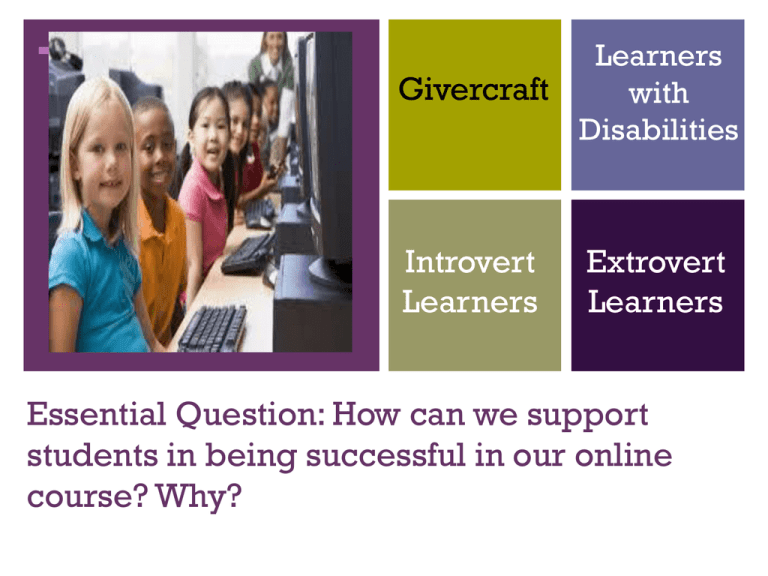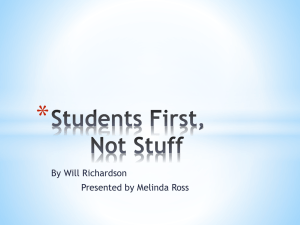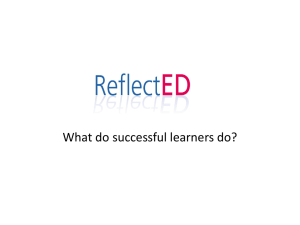EDET674.Wk7 - WordPress.com
advertisement

+ Learners Givercraft with Disabilities Introvert Learners Extrovert Learners Essential Question: How can we support students in being successful in our online course? Why? + Introvert Learners - are oriented primarily toward the inner world; thus they tend to focus their perception and judgment on concepts and ideas. Givercraft is a great place where introvert learners foster their social skills with Givercraft learners and further develop communication skills with other learners from the Givercraft communities. Givercraft teachers could create a learning environment which help prevent learners feeling of isolation by creating a comfortable Givercraft learning environment in which they can share their concepts and build a community of ideas; in turn, establishes a positive relationship with other Givercraft learners. Hozweiss et al. (2014) stated that by emphasizing students to develop peer relationships; encourages a sense of belonging are especially important for academic success. + Extrovert Learners - are oriented primarily toward the outer world; thus they tend to focus their perception and judgment on people and objects. Givercraft provides an environment which permits extrovert learners to express their communication skills and bring forth their ideas within Givercraft by using Givercraft’s tools. Givercraft teachers could guide and mentor Givercraft learners by carefully designing activities/scenarios which challenges learners and help by offering feedback on activities/scenarios that encourage interaction, dialogue and critical thinking. A major aspect of learner’s online experiences that facilitator provide is setting the climate for learning through encouragements, acknowledging and reinforcing learner’s contributions (De la Varre et al., 2014) + Learners with Disabilities Flexibility and individualized learning are two major factors driving the increasing attendance of students with disabilities in online learning. Givercraft community is an online learning environment which promotes creativity and provides learners the chance to create an unique area of their own. Givercraft teachers could first understand learners’ strengths and weaknesses, such as, prior content knowledge, technology skills, reading level, organizational skills, motivation, initiative, and abilities/disabilities. By understanding learners’ strengths and weaknesses, teachers could create a learning that accommedates their needs. Serianni & Coy stated that virtual courses typically incorporate a large number of help, reviews, direct teaching tools, as well as online tutoring to support struggling students (2014). + How can we support students in being successful in our online course? In order for facilitators to support students in being successful in our online course is first by being aware that students are coming in with variety of background knowledge, diverse learning styles, and various technology abilities. In understanding what students are coming in with, facilitators can create learning environments which are conducive to students’ successes in our online course. + References Serianni, B. b., & Coy, K. (2014). Doing the Math: Supporting Students With Disabilities in Online Courses. Teaching Exceptional Children, 46(5), 102-109. Kumar, S. s., & Antonenko, P. (2014). Connecting practice, theory and method: Supporting professional doctoral students in developing conceptual frameworks. Techtrends: Linking Research & Practice To Improve Learning, 58(4), 54-61. de la Varre, C., Irvin, M. J., Jordan, A. W., Hannum, W. H., & Farmer, T. W. (2014). Reasons for student dropout in an online course in a rural K–12 setting. Distance Education, 35(3), 324-344. Holzweiss, P. C., Joyner, S. A., Fuller, M. B., Henderson, S., & Young, R. (2014). Online graduate students’ perceptions of best learning experiences. Distance Education, 35(3), 311-323. Moore, M & Kearsley, G. (2012). Distance education: a systems view of online learning. Wadsworth Cengage Learning. Belmont, CA. Offir, B., Bezalel, R. & Barth, I. (2007). Introverts, extroverts, and achievement in a distance learning environment. American Journal of Distance Education. Routledge.







